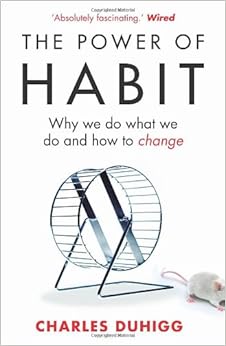
In
The Power Of Habit – Why we do what we do and how to change
– author Charles Duhigg takes us into the thrilling and surprising
world of the scientific study of habits. The book is an eye-opener
into how habits change lives both of individuals and corporates.
Though all of us know how difficult it is to form good habits and get
rid of bad habits, this book made for some very interesting reading.
A few examples of what I found fascinating throughout the book
follow.
In
one example of a man who had lost parts of his memory, one of the
doctors makes a beautiful comment, “I saw how rich life can be even
if you can't remember it. The brain has this amazing ability to find
happiness even when the memories of it are gone.”
“Keystone
habits” matter more than others in remaking businesses and lives.
They can influence how people work, eat, play, live, spend and
communicate. Keystone habits start a process that, over time,
transforms everything. While discussing these habits, the book talks
about how they help explain how Michael Phelps became an Olympic
champion and how Alcoa became one of the best performing stocks in
the Dow Jones index, while also becoming one of the safest places on
earth.
Duhigg
states how routines are habits which we do without thinking. Habits
create cultures where new values become ingrained. Small wins help
create widespread changes, for example, keeping a food journal helps
monitor one's diet leading to better health.
The
book also highlights the power of social peer pressure in leading to
worldwide movements. Most movements happen because of strong ties of
friendship and weak ties of peer pressure giving protestors a new
sense of self identities. A wonderful example is the protests against the race issues in the USA.
Another
piece of discussion that I found interesting was the one on
sleepwalking. Mark Mahowald, a professor of neurology at the
University of Minnesota and a pioneer in understanding sleep
behaviours says, “Sleepwalking is a reminder that wake and sleep
are not mutually exclusive.” There's also an interesting study
conducted by a cognitive neuroscientist Reza Habib where he was
particularly interested in looking at the brain systems involved in
habits and addictions.
There's
a fascinating piece of information on William James whose 1892 quote,
“All our life, so far as it has definite form, is but a mass of
habits.” features in the prologue. James spent 12 months believing
he had control over himself and his destiny, that he could become
better, that he had the free will to change. He later wrote that the
will to believe is the most important ingredient in creating belief
in change. And that one of the most important methods for creating
that belief was habits.
Duhigg
offers a four-stage plan to form or reshape habits. Identify the
routine, Experiment with rewards, Isolate the cue and Have a plan. As
the author says, Once you know a habit exists, you have the
responsibility to change it.
I
hope now that I have read the book I will be able to at least change
a few of my habits and, thus, change my life as many of the people
mentioned in the book have done.
